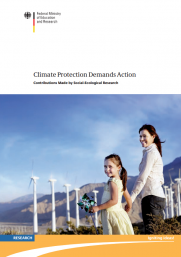
Climate Protection Demands Action

Excerpt
The findings from the latest report issued by the Intergovernmental Panel on Climate Change (IPCC) leave no doubt that climate change is growing, picking up pace and most probably caused by human actions and decisions. The scientifi c community and the political sector largely agreed that global carbon dioxide emissions must be reduced by half by the year 2050 if the rise in the global temperature is to be limited to less than 2° C above preindustrial levels. In view of developing and newly industrialising countries‘ legitimate need to catch up, achieving this goal will require industrialised nations to reduce their greenhouse gas emissions by up to 80 per cent by that time. There is also growing agreement that fundamental structural changes will be needed in order to keep the consequences of climate change to a manageable scale.
Climate change also affects Germany. Numerous studies (such as The Stern Review which focuses in particular on the economic implications of global warming) have documented the massive economic impact of climate change and the German economy is already preparing itself for the changes it will bring. This is clearly shown by the business reports issued by reassurance companies and the analyses conducted by Deutsche Bank‘s research institute DB Research. Thus, issues revolving around adaptation or – to be more precise – around society‘s capability to adapt to the already noticeable effects of climate change are already on the agenda. The question of whether it will be possible for societies to develop the required adaptability will vitally depend on whether greater attention is given to social and ecological interactions in addition to technical and economic considerations.
- Issue:
- Climate Change
- Region:
- Europe
- Country:
- Germany
- Year Published:
- 2009
- Authors:
- Thomas Jahn, Rainer Grießhammer, Bernd Hirschl, Maik Hosang, Florian Keil, Winfried Schröder, Heike Walk
- Institution:
- Federal Ministry of Education and Research (BMBF, Germany)

